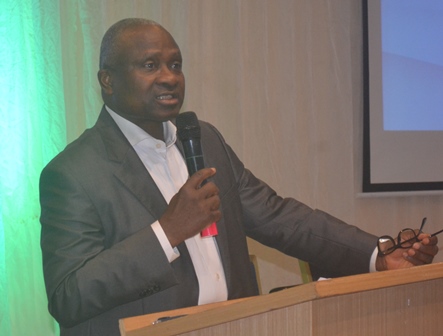Lagos restates resolve to increase access to healthcare through health insurance

The Lagos State Government has restated its resolve to increase access to quality and affordable health care service through the implementation of its much awaited Health Insurance Scheme (LSHS).
The State Commissioner for Health, Dr. Jide Idris who disclosed this at the end of the 2017 State Council on Health Meeting held recently noted that implementation of the LSHS has lent credence to the State Government’s position that all people and communities should have access to needed promotive, preventive, curative, rehabilitative and palliative health services.
He added that such services must be of sufficient quality, be effective, and residents should not suffer financial hardship when paying for them.
“This year’s session, with the theme: ‘Universal Health Coverage – Working towards a Sustainable Health Care Agenda’ and sub-theme: Instituting the Lagos State Health Scheme, is especially significant at this time as the State is on the verge of commencing the Lagos State Health Scheme (LSHS)”, the Commissioner said.
Idris explained that the journey to having a State Health Insurance Scheme has been a long but purposeful one stressing that the seed was planted at the beginning of democratic dispensation in 1999 as a necessary strategic intervention towards the State’s Health Sector Reform.
The Commissioner who stated that the program was put on hold until the national policy milieu provided an enabling environment for States willing to implement a State Health Insurance Scheme noted that the Lagos State Government resolve to have its own scheme is further evidenced by the fact that the State’s health financing direction was a major subject matter at the last two State Councils on Health meeting held in 2013 and 2015.

“At the 2015 State Council on Health in particular, it was agreed that the LSHS should be made compulsory to promote universal coverage, the payment structure for the scheme should be flexible and the benefit package should be made robust and easy to understand; so it is attractive to prospective clients and ensures ease of access”, he said.
Idris stated that the state is proud to be the first in achieving legislative backing for a mandatory Social Health Insurance Programme which was signed into Law in 2015, adding that since the signing of the law, a lot of work and due diligence have been done by a committed Core Implementation Team comprising of technical partners and recognized individuals within the Health Financing Space.
“It might seem like a lot of time has passed since the enactment of the law for the implementation of the scheme to be just commencing, however a lot of technical studies and pilot schemes have been done to ensure that we get it right as the scheme is expected to be a catalyst for the Lagos State Health Reform,” he said.
The Commissioner while stating that the presentations made at the meeting had given an “overview of the scheme, show the progress of the work that has been done so far and perhaps address some of the anticipated challenges,” averred that the meeting has also provided an opportunity to get valuable insights and contributions with respect to the implementation of the scheme.
“As the State prepares to formally roll-out with its social marketing initiative heralding the commencement of enrolment by the State’s residents, we consider this forum a strategic medium for sensitizing major stakeholders on the key elements of the scheme and the process of its implementation”, he added.
Idris revealed that after the end of the council deliberations, some resolutions were made on two major issues which include informal sector participation and enrolment in the LSHS as well as domestic resource mobilization to fund the scheme.
“It was resolved that to effectively gain traction within the informal sector in terms of coverage of the LSHS, premium payment should be broken down based on earnings, premium collection should be brought to their places of business and several agents should be engaged to effect same”, he said.
He added also that the council resolved that there should be massive enlightenment and sensitization of the informal sector to aid participation in the scheme while capacity building and orientation should be invested in to enhance health-seeking behavior.
Idris noted also that the part of the resolutions include leveraging on the use of information technology such as social media; use of IEC materials such as fliers, handbill, posters and banners; need for inter sectoral collaboration to leverage on existing structures and mechanisms; and means of enforcement should be built around social services.
The Commissioner added that the council agreed that ensuring effective and sustainable resource mobilization could be achieved through ensuring a participatory approach in the engagement of stakeholders, development of guidelines for the operationalization of Lagos State Health Fund (LASHEF) and engagement of key legislators and building on multi-sectoral ministerial participation.
He said that the council believed that leveraging on promising and easily achievable areas such as sector specific allocations and promotion of efficiency as well as establishment of well-defined and transparent management structures in the health sector would ensure effective and sustainable resource mobilization.
“Ensuring that the one percent consolidated revenue fund (CRF) is separated from the traditional health envelope; effectively marketing the benefits package under the scheme and ascertaining that it is competitive and attractive to potential enrollees and re-prioritizing allocation to health in the Lagos State budget would promote effective and sustainable resource mobilization”, Idris said.
The State Council on Health is the highest policy advisory body on health in Lagos State and it provides a veritable forum for dialogue between a broad spectrum of decision makers, policy implementers and key stakeholders from all spheres of the Lagos Health Sector.

